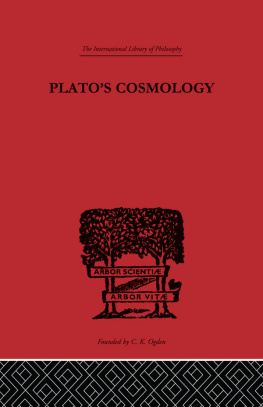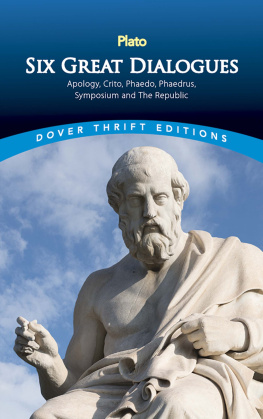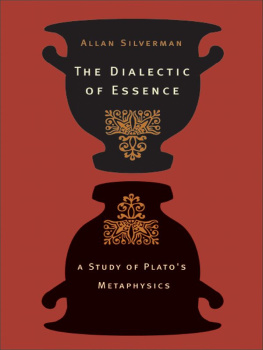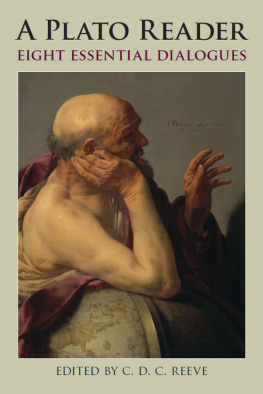About the Author
Having been persuaded by Platos Republic that Justice requires the philosopher to go back down into the Cave, William Henry Furness Altman devoted his professional life to the cause of public education; since retiring in 2013, he has been working as an independent scholar on Cicero and the continuation of Plato the Teacher. Born in Washington D. C. where he was educated at the Sidwell Friends School, and with degrees in philosophy from Wesleyan University, the University of Toronto, and the Universidade Federal de Santa Catarina, he taught in public high schools in Vermont, California, Massachusetts, Connecticut, and Virginia; between 1980 and 2013 he taught social studies, history, philosophy, English, drama, and Latin as well as offering extra-curricular instruction in Ancient Greek. He began publishing scholarly articles in philosophy, intellectual history, and classics in 2007; his Plato the Teacher: The Crisis of the Republic, third of a five-volume study of the reading order of Platos dialogues, was published by Lexington Books in 2012; by that reckoning, this book constitutes the fourth volume with the fifth scheduled to appear later this year, likewise published by Lexington, as The Guardians on Trial: The Reading Order of Platos Dialogues from Euthyphro to Phaedo. With the publication of Friedrich Wilhelm Nietzsche: The Philosopher of the Second Reich (Lexington, 2013) he completed A German Trilogy that includes Martin Heidegger and the First World War: Being and Time as Funeral Oration (Lexington, 2012) and his first book, The German Stranger: Leo Strauss and National Socialism (Lexington, 2011). He subsequently edited Brills Companion to the Reception of Cicero (Brill, 2015) and The Revival of Platonism in Ciceros Late Philosophy: Platonis aemulus and the Invention of Cicero will be published by Lexington later this year. He has two sons, Philip and Elias, two grandchildren, and is married to Zoraide; they currently reside in Florianpolis, the island capital of Santa Catarina (Brasil).

The Guardians in Action
Published by Lexington Books
An imprint of The Rowman & Littlefield Publishing Group, Inc.
4501 Forbes Boulevard, Suite 200, Lanham, Maryland 20706
www.rowman.com
Unit A, Whitacre Mews, 26-34 Stannary Street, London SE11 4AB
Copyright 2016 by Lexington Books
All rights reserved. No part of this book may be reproduced in any form or by any electronic or mechanical means, including information storage and retrieval systems, without written permission from the publisher, except by a reviewer who may quote passages in a review.
British Library Cataloguing in Publication Information Available
Library of Congress Cataloging-in-Publication Data Available
Includes bibliographical references and index.
978-1-4985-1786-7 (cloth : alk. paper)
978-1-4985-1787-4 (electronic)
 The paper used in this publication meets the minimum requirements of American National Standard for Information SciencesPermanence of Paper for Printed Library Materials, ANSI/NISO Z39.48-1992.
The paper used in this publication meets the minimum requirements of American National Standard for Information SciencesPermanence of Paper for Printed Library Materials, ANSI/NISO Z39.48-1992.
Printed in the United States of America
in memoriam
Stanley Rosen (1929-2014)
Diskin Clay (1938-2014)
Samuel Scolnicov (1941-2014)
interlocutoribus sero inventis
And thus among those things that would lead our thought toward the vision of what is would be the study of the One [ ].
Republic 525a1-2
Dont move the unmovables [ ].
Laws 684e1; cf. 842e9-843a1, and 913b9
The Battle Hymn of the Republic
And is not this true of the good likewise: that the man who is unable to define in his discourse, abstracting from all other things the Idea of the Good [ ], and who cannot, as if in battle [ ], through all refutations emerging, not eager to refute by recourse to opinion [] but to being [], proceeding throughout in all of these with the discourse un-toppledthe man who lacks this power, will you say, does not really know the good itself or any other good, but that if he joins himself [] in any way to some image [], he does so [] by reputation [] but not knowledge [], dreaming and dozing through his present life, and before he awakens here, he will arrive at the house of Hades and fall asleep for ever?
Republic 534b8-d1
Acknowledgements
It is high time someone acknowledged that we are living through a technological revolution that is making the republic of letters that flourished five hundred years ago during the Renaissance the only adequate analogue for our own scarcely untroubled times. This book owes its existence to the possibilities created by this revolution: written for the most part far from research libraries, and in what can safely be described as physical isolation, it depends almost entirely on ready access to books and articles through electronic media. Nor is it only a question of scholarly matter: the mechanics of writing a scholarly book today would provoke the lip-bitten envy of all earlier ages. The ability to type effortlessly in Greek, the ready insertion of footnotes, the ease of revision, the ability to conduct word searches, all these and more obviate the painful labors of the past; to paraphrase Juvenal, it is now difficult not to write a scholarly book. How many times does Plato use the word in Parmenides, and in what dialogues does he mention Ibycus or the Ilisus? Of the host of friends who have helped me to gain electronic access to books and articles, it is perhaps best to say nothing, but who today can avoid acknowledging the invaluable assistance of the Internet, Internet Archive, Google Books, Wikipedia, J-STOR, Project Muse, and Perseus? An article received electronically during the night, read with interest over breakfast, has often led to a search for the authors address, an email message, and then mirabile dictu to a quick and amiable response from its author by dinnertime; a cursory search of recent activity in my email account brings to mind the kindnesses and erudition of Michael Beanie, Betty Belfiore, Harry Berger, Daniel Bloom, Dougal Blyth, Beatriz Bossi, Sarah Broadie, Leslie Brown, John Cooper, Nicholas Denyer, Russ Dancy, Alfred Dunshirn, Dorothea Frede, Mary-Louise Gill, Andrew Gregory, Edward Jeremiah, Rusty Jones, Christopher Moore, Nathalie Nercam, Noburo Notomi, Naomi Reshotko, Eric Sanday, Mehmet Tabak, Leonardo Tran, Karine Tordo Rombaut, Dave Yount, and Donald Zeyl. And all this is but the tip of an iceberg.
Even without a university affiliation, then, I have muddled through, thanks to the kindness of those I can no longer, because of technology, call strangers. I am particularly grateful to Fernando Rey Puente and Matthew Sharpe for inviting me to share my thoughts about Plato at the Universidade Federal de Minas Gerais and Deakin University; since Australia is on the other side of the world, the warm friendship that developed with Matt, well before the visit, makes the larger point patent. Outside of the virtual world of electronic communication, I had never met Kathy Eden before she made it possible for me to work in the Columbia University library during the summer of 2015. By attending two conferences in the summer of 2014one in Israel on Plato and Xenophon, the other in Thessaloniki on the Presocraticsmy colleagues managed to teach me what it really means to be a Socratic; particular thanks to Nili Alon Amit and Jenny Bryan, who likewise attended both. It was in Greece that I finally met Lidia Palumbo in person, and I am grateful to her for reading portions of my book in manuscript, although, thanks to technology, that is scarcely the right word for it. Thanks in this regard are also due to Woody Belangia, Maicon Engler, Alfonso Florez, Scott Hemmenway, Peter Kalkavage, Topher Kurfess, and Nathan Sawatzky. To Peter I am also grateful for permitting me to make good use of his excellent translation of











 The paper used in this publication meets the minimum requirements of American National Standard for Information SciencesPermanence of Paper for Printed Library Materials, ANSI/NISO Z39.48-1992.
The paper used in this publication meets the minimum requirements of American National Standard for Information SciencesPermanence of Paper for Printed Library Materials, ANSI/NISO Z39.48-1992.